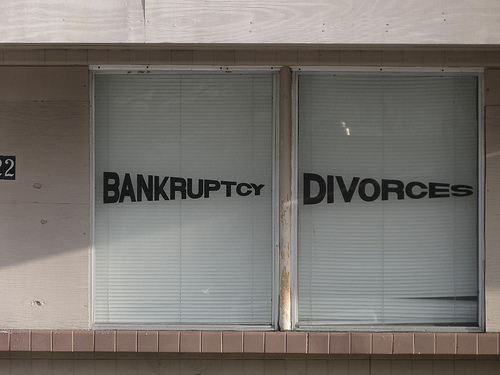
Personal Bankruptcy And Your Business
The effect of a bankruptcy on your business will depend on the type of bankruptcy you choose to file and the way your business is organized. Small businesses are typically organized in one of four ways:
- Sole Proprietorship: A sole proprietorship is unincorporated and has one owner. The business and owner are treated as the same entity, meaning you pay personal taxes on the income the business generates and the business doesn’t pay any taxes separately. The owner is liable for any debts the business incurs.
- Partnership: Two or more owners run the business together, with all partners contributing money, labor, property, or other assets. Each partner pays personal taxes on their portion of the income from the business. Partners are liable for the entire amount of the debts of the business – not just their proportional share.
- Limited Liability Company (LLC): An LLC is its own entity, separate from the owner(s). It must pay taxes and owners are not liable for the business’s debts.
- Corporation: A corporation is a separate legal entity owned by shareholders. Corporations pay their own taxes and shareholders are not liable for the business’s debts.
Chapter 7 Bankruptcy And Your Business
Chapter 7 is “liquidation” bankruptcy – your non-exempt assets are sold and used to pay creditors. You keep your exempt assets and the rest of your debts are discharged. Where does your business fit in?
- If you have a sole proprietorship, you and your business are considered one and the same entity. The business’s assets are also your assets. If they’re not exempt, the trustee can sell them to repay your creditors.
- If you have a partnership, you and your business are considered the same entity just like a sole proprietorship. However, you share the business assets with your partner(s). The trustee can in theory sell those assets with approval from the court, but that approval isn’t very likely to be forthcoming because it isn’t fair to the other partner(s). However, the trustee may be able to sell your entire share of the partnership if he or she can find a buyer for it.
If you own an LLC or a corporation, things are a little more complicated. The business’s assets are safe from the bankruptcy trustee. Your ownership interest, on the other hand, is part of your bankruptcy estate. If you can’t protect it with an exemption, the trustee can do one of four things, depending on what produces the most value for creditors:
- Liquidate: Sell the business assets, pay off its debts, and use the remainder to pay creditors
- Sell: If there’s a buyer, the trustee can simply sell your ownership interest
- Operate As A Going Concern: With the court’s permission, the trustee can allow the business to continue to operate so it can be sold as a going concern
- Abandon: If there’s no buyer or if the business’s debts are greater than its assets, the trustee can simply ignore the business and you’ll still own it
Chapter 13 Bankruptcy And Your Business
In Chapter 13, you’ll work with the bankruptcy court to create a 3-5 year payment plan based on your income. You’ll make monthly payments and the court will distribute it to your creditors. In general, this won’t affect your ownership in your business. However, remember that if your business is organized as a sole proprietorship or a partnership, you and your business are inseparable in the eyes of the law. That means any income the business makes will be considered your income and will be part of the payment plan.
Chapter 13 May Not Be An Option
While Chapter 13 is safe for your business, it may not be available to you. To qualify for Chapter 13, your payment plan must result in your creditors getting at least as much money as they would if you filed for Chapter 7. So, the court will look at what assets would have been sold off in Chapter 7 to pay your creditors.
Say you have a sole proprietorship with assets valued at $100,000 and liabilities of $20,000. The assets are worth $80,000. Or say you own a corporation worth $80,000. Assuming no exemption applies and there’s likely to be a buyer for the assets, that means your creditors would get at least $80,000 under Chapter 7. If your payment plan doesn’t result in at least $80,000 worth of repayment, you’ll have to file under Chapter 7.
A lot of the issue depends on how “liquid” the assets (either your business assets or your ownership) are – how easy it is to turn them into cash. Illiquid assets may be valuable, but they’re not easy to sell and the court won’t be able to say how much your creditors would have gotten in a Chapter 7. Basically, things can get complicated quickly. You’ll need to work with an experienced attorney to determine whether you’re likely to qualify for Chapter 13.
Other Complications
The effect of a personal bankruptcy on your small business is complicated enough if you’re the only owner – the value and liquidity of your assets or ownership may be very difficult to evaluate. Things get even more complicated if you have a partner or if you’re not the only owner of the LLC or corporation. If that’s the case, the court will have to decide how to handle your bankruptcy without being too unfair to the other owners – it can get very complex, very fast. You’ll need an experienced bankruptcy attorney to help you navigate the case and minimize the impact on your business.
The Bottom Line
Starting a business is no small feat, and you certainly want to protect what you’ve worked so hard to build. If you’re considering a personal bankruptcy, contact us today for a free consultation to learn about your options for handling your personal debt while protecting your business.





 Last updated March 30, 2017.
Last updated March 30, 2017. Last updated March 30, 2017.
Last updated March 30, 2017.

